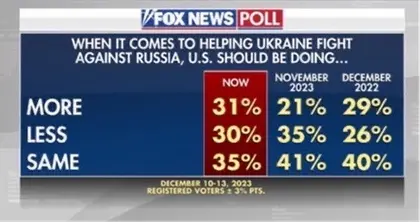The US Congress, after months of impasse, failed to pass President Joe Biden’s $105 billion international aid package, including $61.4 billion for Ukraine assistance, that was introduced in October. No doubt the dysfunction is a by-product of the internal Republican Party struggles evident when former Speaker of the House, Kevin McCarthy was deposed by a group of eight hardline MAGA Republicans, who argued that spending more money on Ukraine, rather than the US border, was a waste.
Following McCarthy’s ouster, the new Speaker, Mike Johnson – an engineer of the legal strategy to thwart certification of Biden’s victory over Donald Trump in the 2020 election – took the helm of Congress and has blocked efforts to develop a bipartisan funding bill for both Ukraine and Israel by insisting on aggressive border legislation that is strongly opposed by the White House.
JOIN US ON TELEGRAM
Follow our coverage of the war on the @Kyivpost_official.
Congressional Republicans sought to tap into mounting “Ukraine fatigue” by exacerbating general anxiety over involvement in long, complex and expensive foreign wars – a sentiment seemingly reinforced by a popular consensus that Ukraine’s efforts to expel Russian forces have stalled.
In fact, polling conducted in November, seen by Kyiv Post, suggests that total Republican support for additional Ukraine was as low as 26 percent, which would mark a significant erosion of support since this past summer. Aside from some Congressmen attacking Ukraine, conservative groups began to actively lobby against additional support for Ukraine.

Zelensky: Trump’s ‘Just and Fair’ Rhetoric on Russia ‘Exactly What Putin Is Afraid Of’
The Heritage Foundation, a once-Reaganesque DC think tank, began to devote its messaging to the argument that too much money was being spent on Ukraine. During the Republican presidential debates, some candidates openly called for reducing support for Ukraine or even warming relations with Russia. Florida Governor and GOP candidate Ron DeSantis went so far as to label the war as “a territorial dispute,” back in March, minimizing the significance of the war to US national security. However, despite these attacks, there are signs that the populist tides are beginning to change in America.
Resurging support?
A poll published by FoxNews, America’s largest conservative cable news channel, showed that respondents who think the US should be doing more to help Ukraine defeat Russia now constitute about a third (31 percent) of those polled, reflecting a 10-point jump from the previous month (21 percent). Combining those who want to increase support with those who think current US support is about right (35 percent), yields an undeniable majority of 66 percent of Americans in favor of ongoing military aid for Ukraine.
New York Times polling, cited by Real Clear Politics, indicates that former President Donald Trump, a Ukraine skeptic, has seen a double-digit decline in earlier primary states. Although Trump continues to command a staggering 52-point lead over his Republican rivals nationally, his success in the primaries is not guaranteed.
American presidential campaign strategy typically dictates that candidates focus their time and money almost exclusively on securing early state primary victories. An early win could solidify interest by major donors, helping to secure needed endorsements and eventually force consolidation of the field, in a battle of attrition.
Pro-Ukraine candidate Nikki Haley was given a strong boost when the neo-conservative Koch Network, a major donor in Republican politics, endorsed Haley at the end of November, with the promise of investing heavily in promoting her candidacy, despite the fact that she is a distant second-place.
This is the oxygen the Haley campaign needs to build momentum going into New Hampshire, the first primary showdown, against opponents such as Vivek Ramaswamy, whose outbursts during the Republican debates have turned off many voters and were themselves the point of mockery by other Republican candidates.
Despite Ukraine affairs moving in the right direction, uncertainty remains. Members of the Republican-controlled Congress have yet to publicly commit to bringing Ukraine funding to a vote, citing the White House’s reluctance to begin negotiations on additional border funding, a topic that promises to be a dominant theme in upcoming budget negotiations and important for Republican voters, as 73 percent of Republicans say that immigration to the US should be curtailed.
What will happen next is anyone’s guess. A potential ace in the hole for Ukraine was secured last week when President Biden signed into law the unprecedented $886 billion National Defense Authorization Act (NDAA), which included a new $300 million authorization for Ukraine.
A less reported provision in the bill extends through FY 2024 the authority for Biden to utilize the Lend-Lease program, originally passed in 2022, but as yet unused. This may prove to be more significant going forward if a bipartisan deal does not materialize.
A similar program was utilized in World War II to bolster our allies and was drawn up to about $50 billion (equivalent to $690 billion today).
For Ukraine’s supporters, following months of withering attacks and bad news, it seems that there is reason for hope that things may be getting brighter in Washington. However, this is a presidential election year when every member of congress and a third of the senate is up for re-election; so all hopes and promises are subject to change upon political expediency.
You can also highlight the text and press Ctrl + Enter










